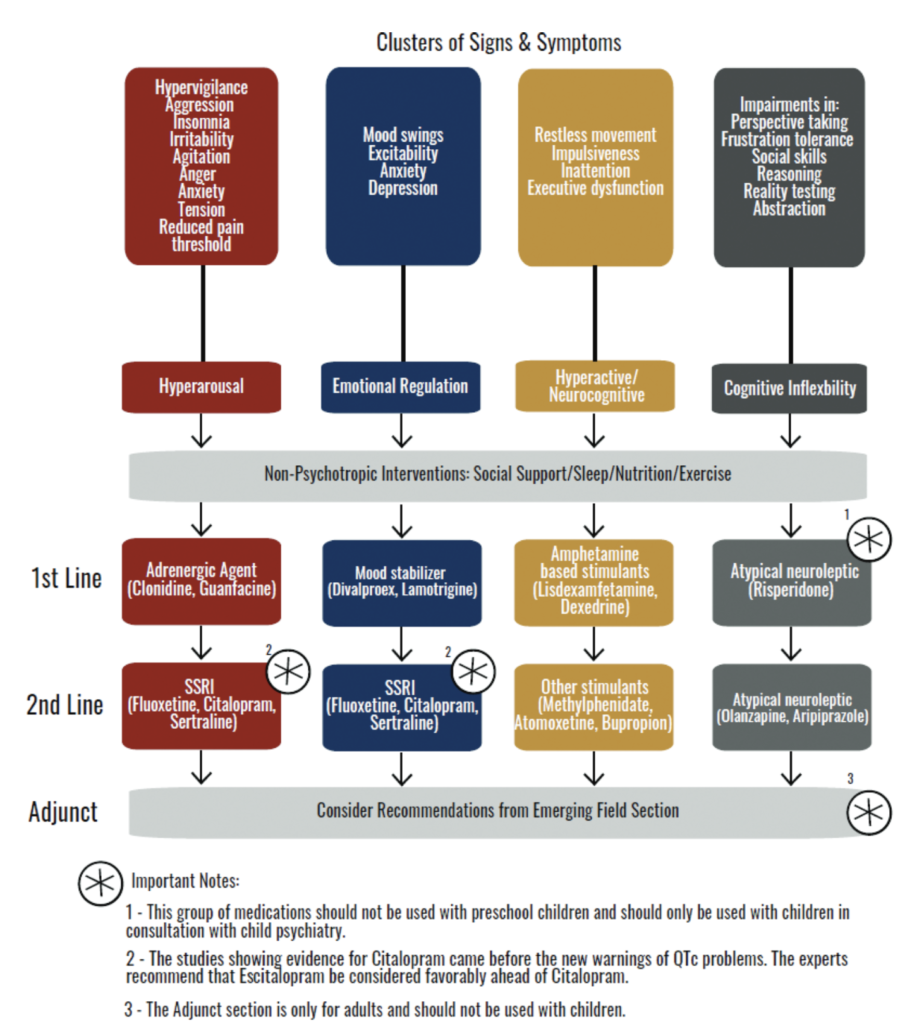A team of experts from across Canada and the US have developed the first ever medication algorithm for individuals with Fetal Alcohol Spectrum Disorder (FASD). CanFASD Research Leads Dr.’s Mansfield Mela and Ana Hanlon-Dearman and CanFASD Family Advisory Committee’s Dorothy Reid are among the co-authors of the study. This algorithm is now an important tool available for clinicians to use to treat individuals with FASD (children and adolescents aged 7 and above, and adults).
An overview of the algorithm
Clinicians such as family doctors, pediatricians, psychologists, and psychiatrists have very little evidence-based guidance on what medications are effective for FASD. As a result, individuals with FASD often receive medical treatment that is sub-optimal and poorly guided. Many individuals with FASD are prescribed a large number of medications at the same time, which can cause harmful side effects. A medication algorithm can help address this problem.
A panel of experts, doctors, and caregivers from multiple backgrounds, who all had experience caring for or working with people with FASD, worked together to develop the algorithm.
“A huge strength of this research project was the collaboration with members of the FASD community,” says Dorothy Reid, co-author of the study and a member of the CanFASD Family Advisory Committee. “This research originated from the FASD community, was developed in consultation with the community, and was created to improve the lives of community members.”
The algorithm is a step-by-step “decision tree” guide that outlines which medications to prescribe for FASD. The first step in the algorithm is “non-psychotropic interventions”. The clinician needs to ensure that the individual with FASD has the necessary environmental, social, and physical health factors, such as a supportive environment and social relationships. This step also includes ensuring individuals are able to get optimal sleep, nutrition, and exercise. These non-medical factors are important to alleviate the symptoms of FASD.
The next step is to identify which group (or “cluster”) of symptoms is most affecting the individual patient. The 4 clusters are supported by theories of brain anatomy and function, and are labelled hyperarousal, emotional dysregulation, hyperactive/neurocognitive, and cognitive inflexibility.
Researchers have identified a list of medications that are effective at alleviating symptoms for each cluster. Once the cluster with the biggest impact is identified, clinicians can prescribe the first recommended medication on that list. If the first medication is not effective, it is removed and the second line medication for the cluster is to be used next, followed by third line medication if needed.
Available open-access
The algorithm has been published in an open-access journal, so that anyone can access the article at no charge. The authors of the study encourage individuals with FASD and/or their caregivers to access the article for their own information. They may also wish to pass along to their doctor.

How to talk to your doctor about using the algorithm
Dr. Mansfield Mela, the lead author of the study, provides some important advice on how individuals with FASD or caregivers can suggest to their doctor to consider using the algorithm.
1. First and foremost, be respectful and allow your doctor to feel that they are still in control of their patient’s care.
2. You can also appeal to your doctor’s curious and helpful nature. Dr. Mela explains, “All doctors are curious by nature, and all doctors want to be helpful and provide the best care for their patients.”
3. It’s also helpful how you communicate to your doctor about the algorithm. Dr. Mela says, “You can explain that this is something that you and your doctor can try together to make both of your lives easier. Outline the risks and benefits for them. You can suggest that you use the algorithm on a trial basis and see what happens, but if it is not working you can stop. If there is any initial resistance you can ask if you can discuss it at the start of your next appointment.”
Using a medication algorithm infographic

The researchers are seeking feedback from clinicians who are implementing the algorithm in their practice. Any feedback will help the research team to further improve and refine the algorithm.


One Comment on “Experts publish the first medication guidelines for people with FASD”
This is a great development. Shared it with our son’s developmental pediatrician and his colleagues 🙂